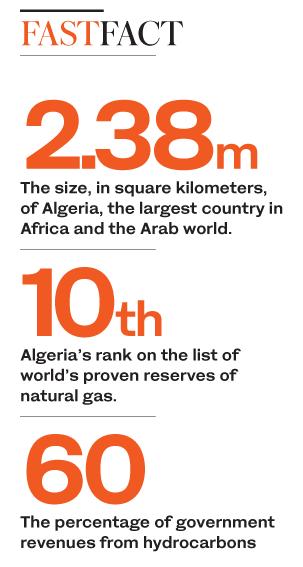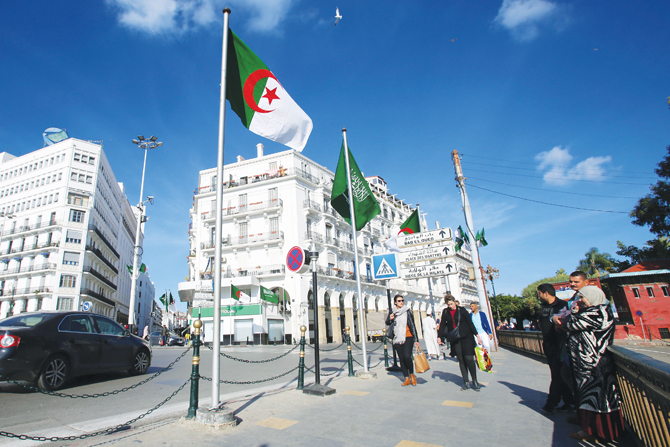ALGIERS: Despite being heavily dependent on its massive oil and gas reserves, Algeria’s government seems to be handling rather well the broader economic effects of extremely volatile crude oil prices.
The slump in prices since the third quarter of 2014, from highs of over $120 per barrel to around $60 now, has seriously dented Algeria’s economy over the past four years.
A report last month by the International Monetary Fund (IMF) said the country’s struggle to plug its budget deficit in the face of lower oil revenues remains a significant challenge for the member of the Organization of the Petroleum Exporting Countries (OPEC).
Over the past four years, the oil price slump has led to the evaporation of nearly half of Algeria’s foreign currency reserves, a large fiscal and budgetary deficit, and higher inflation.
Yet the country seems to be far away from the catastrophic scenario that many had predicted when oil prices were flirting with the $25 mark two years ago. 
Now, four years since the slump began, Algeria has not collapsed, defying predictions of a repeat of 1986, when it faced perhaps the worst economic crisis since its independence from France in 1962.
Buoyed by high oil prices in the early 1980s, Algeria was for many years a high-flying model for most of the world’s developing nations.
It spent billions of dollars on rapid industrialization while heavily subsidizing food prices, winning a reputation as one of the Third World’s few welfare states.
But when prices crashed from $40 per barrel to $10, the economy collapsed as oil revenues accounted for nearly 97 percent of Algeria’s exports at that time.
The crisis led to the country’s entire foreign currency receipts being used to service the hefty external debt that it had stacked up, pushing the government toward an IMF bailout.
Severe austerity measures led to riots by thousands of young, unemployed Algerians angered by inflation rising to almost 100 percent and by a sharply contracting economy, with no jobs and a dramatic reduction in government subsidies that the country had become used to over the years. It took Algeria years to recover.
Eager to avoid making the same mistakes, in 2006 the current President Abdelaziz Bouteflika began using oil revenues to build a sovereign fund and dramatically cut foreign debt to below $3 billion.
But the real safety valve for Algeria’s economy was a fund that by June 2014, around when oil had peaked, was at almost $47 billion, as well as a thick cushion of over $200 billion in forex reserves.
Today these two weapons have come in very handy for the government to keep the economic impact of the oil price drop to a minimum.
Abdelmalek Sellal, who was prime minister from April 2014 to 2017, was stoic about the economy even as experts, foreign and domestic, expressed alarm that Algeria could be headed the way of Venezuela, another large oil producer whose economy lies in tatters today.
Algeria’s government was cautious about bringing in dramatic changes to the welfare state economic model that the country had been following for decades.
Though Sellal recognized later that the situation was not easy to handle, he insisted that Algeria could handle it well, pretty much in line with Bouteflika’s assessment that the country was resilient even though it needed to adopt a new economic paradigm.
The government clearly understands the need to diversify its economy and wean it off hydrocarbons, which still account for almost half the country’s GDP, about 60 percent of government revenues and nearly 95 percent of exports.
Over the past four years, Algeria has been gently nudging its private sector to contribute more to the economy and reduce the over-reliance on hydrocarbons.
In 2016, Sellal launched an ambitious set of reforms aimed at diversifying away from oil and boosting sectors such as manufacturing, agriculture, renewable energy, information and communications technology (ICT) and tourism.
He said his goal was that by 2019, the economy would have moved from “all oil” to “all industry.”
The government targeted 7 percent growth by 2019 and initiated reforms that continue to attract foreign investors in multiple sectors, leading to a modest jump of seven places in the global ranking of the World Bank’s “Ease of Doing Business” last year.
Algeria has also managed to attract several large European companies such as Renault and Volkswagen to set up plants, not only to cater to the domestic and African markets, but also to the more lucrative European markets.
To keep the current account deficit under check, the government has also curbed imports, which had climbed to almost $60 billion in 2014 and have been declining since.

Algerian and Saudi flags are pictured ahead of the visit of Saudi Arabia’s Crown Prince Mohammed bin Salman to Algiers. (Reuters)
Another measure was to push the economy from being largely informal to formal, by making checks mandatory for transactions higher than 1 million dinars ($8,414.60).
The government also introduced an amnesty scheme for tax dodgers, which led to the recovery of nearly 40 billion dinars, according to some estimates.
For the first time since the crisis began four years ago, Algeria has accepted limited foreign debts to manage its economy, though only for select projects such as El-Hamdania port with Chinese financing of $3.3 billion, and a $900 million contract from the African Development Bank to finance a plan to boost industrial and energy competitiveness, in which the government plans to inject $78 billion in the next three years.
In September 2017, soon after taking charge as prime minister, Ahmed Ouyahia announced reforms that have earned the IMF’s praise in its report, although it cautions that the fiscal and current account deficits remain large.
The IMF praised government efforts to diversify the economy, but called for sustained fiscal consolidation and wide-ranging structural reforms to facilitate a more diversified growth model and support private sector development.
To plug the deficit, the government has begun direct borrowing from the central bank instead of tapping international debt markets.
In his five-year plan, Ouyahia aims to balance the budget by 2022 and reverse a deficit that has cut foreign reserves by nearly half.
“If we turn to external debt, as the IMF suggests, we will need to borrow $20 billion a year to repay the deficit, and within four years we will be unable to repay the debt,” Ouyahia had said. “This is what made the government look at non-traditional financing.”
But some experts warn that the government’s measures are not adequate, and that if oil prices do not rebound soon, Algeria is likely to burn through its foreign exchange reserves by 2020.
Hence the urgent need for the government to continue with its reforms and diversify. The next few years could be decisive for Algeria’s economy.



























